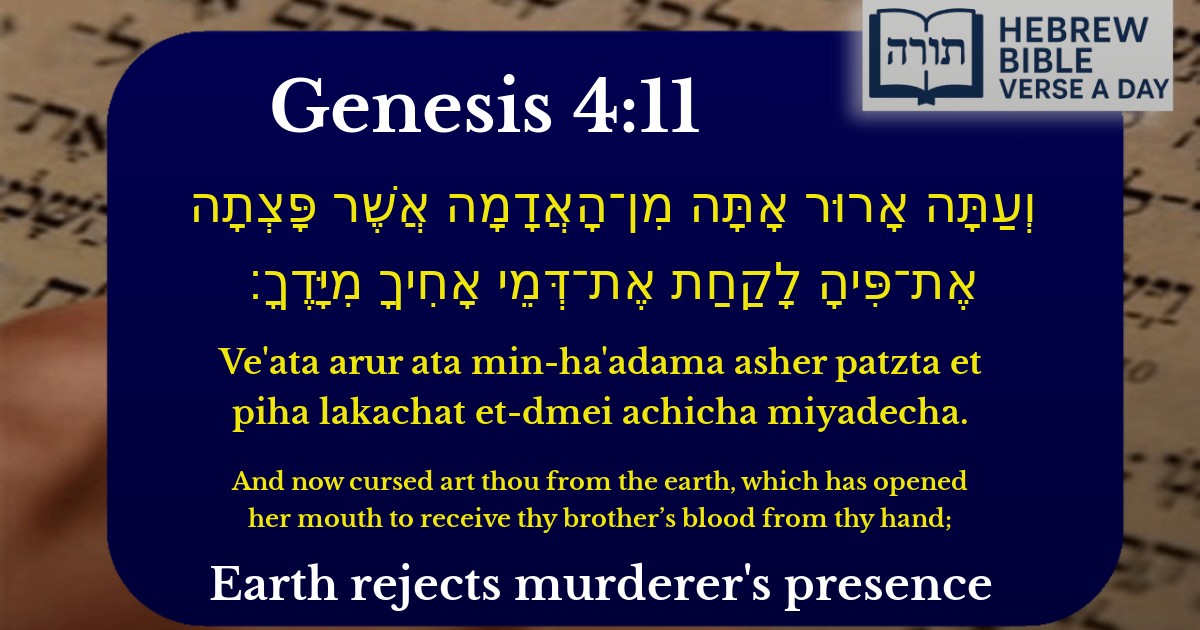Join Our Newsletter To Be Informed When New Videos Are Posted
Join the thousands of fellow Studends who rely on our videos to learn how to read the bible in Hebrew for free!
Hebrew Text
וְעַתָּה אָרוּר אָתָּה מִן־הָאֲדָמָה אֲשֶׁר פָּצְתָה אֶת־פִּיהָ לָקַחַת אֶת־דְּמֵי אָחִיךָ מִיָּדֶךָ׃
English Translation
And now cursed art thou from the earth, which has opened her mouth to receive thy brother’s blood from thy hand;
Transliteration
Ve'ata arur ata min-ha'adama asher patzta et piha lakachat et-dmei achicha miyadecha.
Hebrew Leining Text
וְעַתָּ֖ה אָר֣וּר אָ֑תָּה מִן־הָֽאֲדָמָה֙ אֲשֶׁ֣ר פָּצְתָ֣ה אֶת־פִּ֔יהָ לָקַ֛חַת אֶת־דְּמֵ֥י אָחִ֖יךָ מִיָּדֶֽךָ׃
וְעַתָּ֖ה אָר֣וּר אָ֑תָּה מִן־הָֽאֲדָמָה֙ אֲשֶׁ֣ר פָּצְתָ֣ה אֶת־פִּ֔יהָ לָקַ֛חַת אֶת־דְּמֵ֥י אָחִ֖יךָ מִיָּדֶֽךָ׃
🎵 Listen to leining
Parasha Commentary
📚 Talmud Citations
This verse is quoted in the Talmud.
📖 Sanhedrin 37b
The verse is referenced in the context of discussing the gravity of murder and the concept of bloodshed, illustrating how the earth itself reacts to such a heinous act.
📖 Avodah Zarah 22b
The verse is mentioned in a discussion about the consequences of Cain's actions and the broader implications of sin and punishment.


The Curse of the Earth
The verse (Bereshit 4:11) describes Hashem's pronouncement of a curse upon Kayin (Cain) after he murdered his brother Hevel (Abel). Rashi explains that the earth, which had previously cooperated with Kayin by yielding crops despite his lack of full effort (as noted in verse 4:12), would now be cursed in relation to him. The earth, which had "opened its mouth" to absorb Hevel's blood, would no longer yield its strength to Kayin.
The Earth as Witness and Participant
Midrash Tanchuma (Bereshit 9) elaborates that the earth played two roles in this episode:
The Ramban (Nachmanides) adds that the earth's "opening its mouth" alludes to the concept that nature itself responds to human morality - when humans violate fundamental laws, even the natural world reacts.
The Nature of the Curse
Ibn Ezra explains that the curse "from the earth" means Kayin would be banished from agricultural society - the very earth that had absorbed his brother's blood would resist his attempts to cultivate it. This interpretation aligns with the subsequent verse (4:12) describing Kayin becoming a wanderer.
Moral Implications
The Kli Yakar emphasizes that the verse connects the earth's curse directly to the spilled blood ("thy brother's blood from thy hand"), teaching that violence against others ultimately damages one's relationship with the physical world. This reflects the broader Torah principle that moral transgressions affect our environment (as seen later in the story of the Flood).